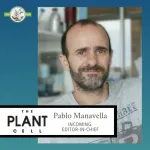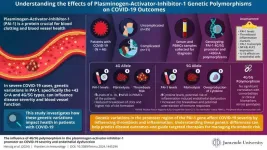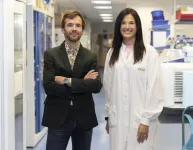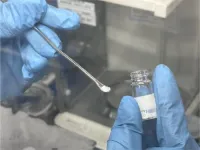A new injectable to prevent and treat hypoglycemia
2024-10-02
(Press-News.org) People with diabetes take insulin to lower high blood sugar. However, if glucose levels plunge too low — from taking too much insulin or not eating enough sugar — people can experience hypoglycemia, which can lead to dizziness, cognitive impairment, seizures or comas. To prevent and treat this condition, researchers in ACS Central Science report encapsulating the hormone glucagon. In mouse trials, the nanocapsules activated when blood sugar levels dropped dangerously low and quickly restored glucose levels.
Glucagon is a hormone that signals the liver to release glucose into the bloodstream. It’s typically given by injection to counteract severe hypoglycemia in people who have diabetes. While an emergency glucagon injection can correct blood sugar levels in about 30 minutes, formulations can be unstable and insoluble in water. In some cases, the hormone quickly breaks down when mixed for injections and clumps together to form toxic fibrils. Additionally, many hypoglycemic episodes occur at night, when people with diabetes aren’t likely to test their blood sugar. To improve commercial glucagon stability and prevent hypoglycemia, Andrea Hevener and Heather Maynard looked to micelles: nanoscale, soap-like bubbles that can be customized to assemble or disassemble in different environments and are used for drug delivery. They developed a glucose-responsive micelle that encapsulates and protects glucagon in the bloodstream when sugar levels are normal but dissolves if levels drop dangerously low. To prevent hypoglycemia, the micelles could be injected ahead of time and circulate in the bloodstream until they are needed.
In lab experiments, the researchers observed that the micelles disassembled only in liquid environments that mimicked hypoglycemic conditions in both human and mice bodies: less than 60 milligrams of glucose per deciliter. Next, when mice experiencing insulin-induced hypoglycemia received an injection of the specialized micelles, they achieved normal blood sugar levels within 40 minutes. The team also determined that glucagon-packed micelles stayed intact in mice and didn’t release the hormone unless blood glucose levels fell below the clinical threshold for severe hypoglycemia. From additional toxicity and biosafety studies in mice, the researchers note that empty micelles didn’t trigger an immune response or induce organ damage.
While more studies are needed, the researchers say their proof-of-concept is a first step toward a new on-demand and effective method for preventing or mitigating extremely low blood sugar levels.
The authors acknowledge funding from the Leona M. and Harry B. Helmsley Charitable Trust; BioPACIFIC Materials Innovation Platform funded by the National Science Foundation; the National Science Foundation Graduate Research Fellowship Program; the National Institutes of Health; and the University of California, Los Angeles Clinical and Translational Science Institute.
The paper’s abstract will be available on Oct. 2 at 8 a.m. Eastern time here: http://pubs.acs.org/doi/abs/10.1021/acscentsci.4c00937
###
The American Chemical Society (ACS) is a nonprofit organization chartered by the U.S. Congress. ACS’ mission is to advance the broader chemistry enterprise and its practitioners for the benefit of Earth and all its people. The Society is a global leader in promoting excellence in science education and providing access to chemistry-related information and research through its multiple research solutions, peer-reviewed journals, scientific conferences, e-books and weekly news periodical Chemical & Engineering News. ACS journals are among the most cited, most trusted and most read within the scientific literature; however, ACS itself does not conduct chemical research. As a leader in scientific information solutions, its CAS division partners with global innovators to accelerate breakthroughs by curating, connecting and analyzing the world’s scientific knowledge. ACS’ main offices are in Washington, D.C., and Columbus, Ohio.
Registered journalists can subscribe to the ACS journalist news portal on EurekAlert! to access embargoed and public science press releases. For media inquiries, contact newsroom@acs.org.
Note: ACS does not conduct research but publishes and publicizes peer-reviewed scientific studies.
Follow us: X, formerly Twitter | Facebook | LinkedIn | Instagram
END
[Attachments] See images for this press release:
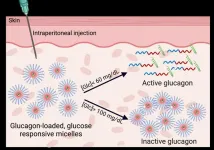
ELSE PRESS RELEASES FROM THIS DATE:
2024-10-02
It’s important to eat your veggies, but some essential vitamins and nutrients can only be found in animals, including certain amino acids and peptides. But, in a proof-of-concept study published in ACS’ Journal of Agricultural and Food Chemistry, researchers developed a method to produce creatine, carnosine and taurine — all animal-based nutrients and common workout supplements — right inside a plant. The system allows for different synthetic modules to be easily stacked together to boost production.
Plants can be surprisingly receptive when asked to produce compounds ...
2024-10-02
The American Society of Plant Biologists (ASPB) is excited to announce Pablo Manavella will serve as the next Editor-in-Chief of The Plant Cell. The Plant Cell is a leading international society journal that publishes novel research of special significance in plant biology, especially in the areas of cellular biology, molecular biology, biochemistry, genetics, development, and evolution.
Manavella is currently a Consejo Superior de Investigaciones Científicas (CSIC) researcher at the Institute for Mediterranean and Subtropical Horticulture (IHSM) in Málaga, Spain. He is the Principal Investigator in a lab focusing on the intricate mechanisms regulating ...
2024-10-02
Despite global vaccination efforts, COVID-19 continues to pose significant risks, leading to severe complications and fatalities. These risks are driven by disrupted coagulation, impaired fibrinolysis, which is the process of breaking blood clots, and heightened inflammatory responses. The fibrinolytic system, crucial for maintaining balance within the coagulation cascade, relies on plasmin-mediated fibrin degradation. Plasminogen activators convert plasminogen into plasmin, an enzyme that breaks down ...
2024-10-02
SAN FRANCISCO —PLOS today announced that it has received a $1.5 million grant from the Robert Wood Johnson Foundation and a $1 million grant from the Gordon and Betty Moore Foundation to support our mission to drive Open Science forward with meaningful change in scholarly publishing. The funds enable PLOS to embark on an ambitious 18-month research and design project to explore how to tackle two barriers that exclude many researchers from meaningfully participating in Open Science: affordability ...
2024-10-02
Researchers at the RIKEN Cluster for Pioneering Research (CPR) have developed technology that can alter, within the body, the recognized identity of proteins. The innovation, published in Nature Communications on October 2, allowed researchers to target mouse tumors with a protein and then transport that protein out of the body. This means that cancer-killing drugs could be sent directly to tumors and then excreted from the body after dropping off their payload. The technology also has the potential to allow multi-purpose drugs that can travel from organ to organ, performing ...
2024-10-02
Smoke From Megafires Puts Orchard Trees at Risk
Effects Last Months, Reducing Nut Crop Yields
By Amy Quinton | October 2, 2023
Long-term smoke exposure from massive wildfires lowers the energy reserves of orchard trees and can cut their nut production by half, researchers at the University of California, Davis, found. The smoke can affect trees for months after a megafire, depressing their bloom and the next season’s harvest. This finding reveals a new danger from wildfires that could affect plant health in both agricultural and natural environments.
Nature Plants published ...
2024-10-02
Health Data Research UK (HDR UK) and the National Research Foundation Singapore (NRF) are pleased to have signed a Memorandum of Understanding (MoU) today, that formalises a collaborative partnership in healthcare and data science. The partnership will leverage cutting-edge data science and research, with a focus on trustworthy data use to power improvements in healthcare, research and innovation, strengthening existing links between the UK and Singapore.
The MoU was signed by Permanent Secretary for National Research and ...
2024-10-02
CNIO researchers have discovered that cancer perverts certain brain cells, the astrocytes, and causes them to produce a protein that works in favour of the tumour.
A drug, silibinin, inhibits this protein, and could be used to help treat brain metastasis with immunotherapy. A clinical trial is underway.
The work is published in the American Association for Cancer Research's journal Cancer Discovery.
Researchers at the Spanish National Cancer Research Centre (CNIO) propose a new treatment for brain metastases that respond poorly, or not at all, to immunotherapy, and provide a biomarker to predict ...
2024-10-02
Often overlooked, rechargeable batteries play an important part in contemporary life, powering small devices like smartphones to larger ones like electric vehicles. The keys to creating sustainable rechargeable batteries include having them hold their charge longer, giving them a longer life with more charging cycles, and making them safer. Which is why there is so much promise in all-solid-state batteries.
The problem so far is discovering which solid electrolytes offer such potential advantages.
In a step toward that goal, an Osaka Metropolitan University research group led by Assistant Professor Kota Motohashi, Associate Professor Atsushi Sakuda, ...
2024-10-02
Phones can be useful tools in classrooms to remind students of deadlines or encourage more exchange between students and teachers. At the same time, they can be distracting: Students report using their phones for non-academic purposes as often as 10 times a day. Thus, in many classrooms, phones are not allowed.
Now, researchers in the US have investigated if letting students use their phones for very brief amounts of time – dubbed phone or technology breaks – can enhance classroom performance and reduce phone use.
“We show that technology breaks may be helpful for reducing cell phone use in the college classroom,” said Prof Ryan Redner, a ...
LAST 30 PRESS RELEASES:
[Press-News.org] A new injectable to prevent and treat hypoglycemia

